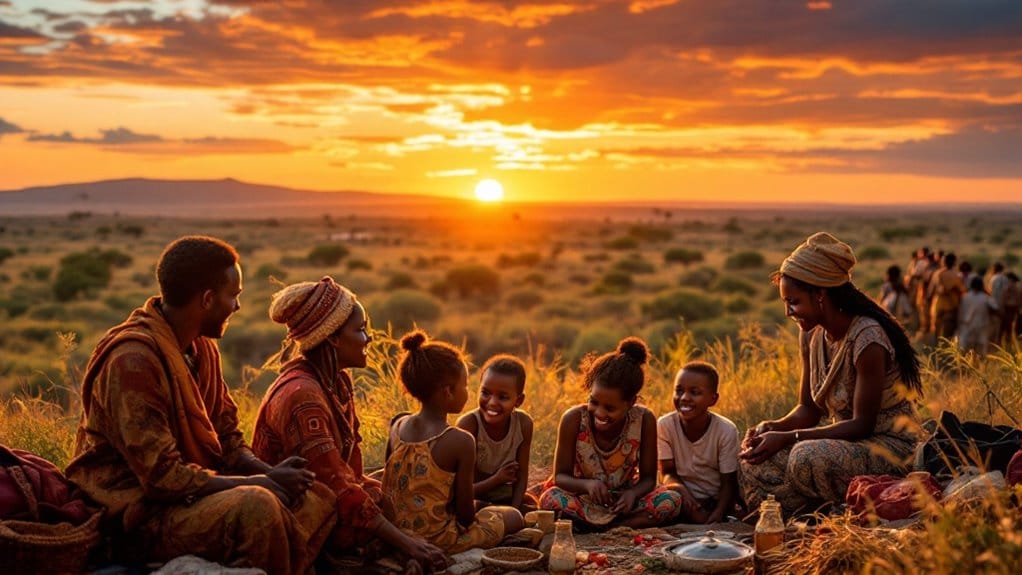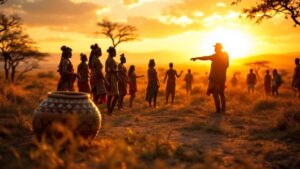You might not realize that over 20 million people globally are employed in the tourism sector, much of which is driven by safaris. This industry can create significant economic opportunities for local communities, but the effectiveness of these benefits often depends on how the tourism is managed and integrated with community needs. Are these ventures truly uplifting the local population, or do they sometimes lead to unintended consequences? Exploring this topic reveals a complex interplay of economics, culture, and conservation, raising important questions about the real impact of safari tourism on communities.
Key Takeaways
- Safari tourism creates over 20 million jobs in Africa, significantly improving local living standards and economic stability.
- Revenue from tourism is reinvested into education and healthcare, enhancing community infrastructure and quality of life.
- Local communities engage in conservation, reducing poaching and fostering sustainable wildlife management through employment in tourism.
- Infrastructure improvements from safari tourism provide better access to essential services and support local businesses, leading to long-term economic benefits.
- Genuine community involvement in tourism ensures equitable benefits, strengthening support for conservation and sustainable practices.
Economic Empowerment Through Safari Tourism
Safari tourism serves as a powerful engine for economic empowerment in local communities across Africa. By creating job opportunities, it not only elevates living standards but also reduces reliance on unsustainable practices like poaching.
With over 20 million people employed in Africa's tourism sector, particularly in hospitality and guiding roles, the economic impact is profound. You'll find that the revenue generated often reinvests itself into community development, enhancing local education, healthcare, and infrastructure projects. This reinvestment fosters a cycle of improvement, uplifted by the very essence of safari tourism.
As locals gain employment in safaris, they acquire valuable skills, fostering professional growth and economic stability. This empowerment leads to a greater sense of pride and ownership within local communities, as residents actively engage in wildlife conservation efforts linked to tourism.
The tourism industry, when aligned with sustainable practices, not only benefits the economy but also nurtures the environment and the cultural integrity of these communities. Ultimately, you'll see that safari tourism can create a symbiotic relationship between economic growth and communal well-being, making it an essential force for positive change.
Job Creation and Local Employment
The impact of safari tourism on local employment is significant and far-reaching. By creating over 20 million jobs across Africa, the safari industry plays an essential role in enhancing economic stability for local communities. This surge in job creation not only empowers local residents but also fosters a sense of belonging and pride within these communities.
Here are four key areas where safari tourism positively impacts local employment:
- Diverse Job Opportunities: Safari tourism opens doors in hospitality, guiding, and conservation sectors, creating varied employment options for residents.
- Economic Contributions: In regions with private game reserves, safari-related jobs contribute to over 60% of local employment, taxes, and GDP.
- Skill Development: Employment in the safari industry promotes skill-building and professional growth, equipping locals with valuable expertise for sustainable tourism practices.
- Improved Living Standards: Increased job availability leads to enhanced living conditions, reducing poverty and reliance on unsustainable practices.
Through these avenues, safari tourism not only generates jobs but also nurtures resilient communities ready to embrace sustainable practices for a brighter future.
Community Engagement in Conservation
Through active participation in conservation efforts, local communities find both empowerment and purpose in safeguarding their natural surroundings. Community engagement in conservation is essential, especially in areas where tourism thrives. By working with safari operators, local residents gain employment opportunities as guides and lodge staff, reducing reliance on poaching and unsustainable practices. This shift not only bolsters wildlife management but also fosters a deep sense of pride and stewardship among community members.
Moreover, the revenue generated from tourism is reinvested into local education initiatives and conservation awareness programs. These efforts ignite a passion for wildlife conservation among children, enhancing community knowledge about environmental protection. Training programs provided by safari operators equip locals with the skills needed for sustainable practices, ensuring that they play a fundamental role in preserving their ecosystems.
Collaborative efforts lead to tangible benefits, such as improved living standards and economic stability. The synergy between community engagement and conservation creates a cycle of positive change, where local communities thrive alongside their natural environments.
Infrastructure Development and Benefits
Many communities benefit from the infrastructure improvements driven by safari tourism, as enhanced roads and facilities create vital access for both visitors and residents. This development goes beyond mere convenience; it transforms local lives by providing essential resources and services.
- Healthcare Facilities: Increased revenue from safari tourism supports the establishment of local healthcare facilities, ensuring that communities receive better health services and care.
- Educational Resources: Funds generated through safari tourism are allocated for building schools and providing educational resources, promoting literacy and skill development among local children.
- Economic Stability: The improvements in infrastructure lead to long-term economic stability, allowing local businesses to thrive and create job opportunities.
- Quality of Life: Enhanced infrastructure not only facilitates better services for visitors but also elevates the overall quality of life for local communities, ensuring access to essential services like clean water and transportation.
Cultural Heritage Preservation Efforts
Cultural heritage preservation thrives in environments where tourism intersects with local traditions, and safari tourism plays a crucial role in this dynamic. By incorporating visits to local villages and cultural performances, safari tourism creates economic incentives for local communities to preserve their rich cultural heritage.
When you engage with local residents, you foster respect and understanding, encouraging them to maintain and showcase their traditional practices. The revenue generated from cultural heritage activities allows locals to invest in preserving their customs and storytelling traditions.
This newfound interest in local cultures not only promotes conservation initiatives but also guarantees that these invaluable traditions are passed down through generations. You'll find that community empowerment is at the heart of this preservation; when communities take the lead in sharing their cultural narratives, a sense of pride and identity emerges.
Furthermore, the interactions between tourists and locals facilitate meaningful cultural exchange, enriching the experience for everyone involved. As safari tourism flourishes, it creates a symbiotic relationship that enhances cultural heritage preservation efforts, benefiting both local communities and visitors alike.
This commitment to safeguarding traditions guarantees that cultural legacies continue to thrive in an ever-changing world.
Environmental Practices in Safari Tourism
Safari tourism is increasingly adopting environmentally sustainable practices that prioritize the health of ecosystems while enhancing visitor experiences. By focusing on responsible tourism, safari operators are making strides to reduce their environmental impact and support local communities.
Here are four key practices making a difference:
- Eco-friendly accommodations: Many operators now utilize solar energy systems and promote plastic-free environments, minimizing waste and conserving resources.
- Sustainable management: The use of eco-friendly vehicles and rainwater harvesting techniques helps in reducing carbon footprints and bolstering conservation efforts, guaranteeing that natural resources are managed responsibly.
- Wildlife tracking: Technology plays an essential role in resource management, allowing visitors to engage in wildlife tracking while promoting environmentally responsible behaviors.
- Collaboration with local communities: By working together, safari operators and local communities can enforce sustainable practices and guarantee that the benefits of tourism are shared equitably, reinforcing conservation goals.
Through these initiatives, safari tourism not only enhances visitor experiences but also fosters a deeper connection with the environment, paving the way for a more sustainable future.
Technological Innovations Driving Change
As you explore the world of safari tourism, you'll notice how wildlife tracking technologies are transforming the way you experience nature.
These innovations not only enhance conservation efforts but also allow you to witness animal behavior in their natural habitats.
Additionally, eco-friendly travel platforms empower you to make responsible choices that support local communities and sustainable practices.
Wildlife Tracking Technologies
Wildlife tracking technologies are revolutionizing conservation efforts and enhancing our understanding of animal behaviors in their natural habitats. By utilizing tools like GPS collars and drones, you can witness how these innovations directly impact conservation strategies and local communities.
Here are four key benefits of wildlife tracking technologies:
- Enhanced Monitoring: Real-time data allows researchers to track animal movements, reducing human-wildlife conflicts and improving habitat protection.
- Anti-Poaching Support: Swift responses to threats against endangered species, such as black rhinos, bolster anti-poaching efforts and safeguard biodiversity.
- Ecotourism Engagement: Mobile apps provide tourists with access to tracking data, deepening their understanding of conservation and the importance of healthy ecosystems.
- Community Collaboration: As tracking technologies advance, they create opportunities for local communities to participate in sustainable wildlife management practices, ensuring equitable economic benefits from ecotourism.
These innovations not only improve wildlife observation for tourists but also contribute to the long-term conservation of habitats, fostering a sense of belonging and shared responsibility among all stakeholders involved.
Eco-Friendly Travel Platforms
Innovative technology is reshaping how travelers engage with the world, particularly in the domain of eco-friendly travel platforms. These platforms utilize online booking systems that prioritize sustainable accommodations and activities, allowing you to choose options that minimize environmental impact while supporting local communities.
With mobile apps and websites offering real-time information on responsible safari operators, you can make informed decisions that contribute positively to wildlife preservation. Data analytics play an essential role here, enhancing visitor management in national parks to guarantee that tourist numbers are regulated, thereby preventing overcrowding and habitat disturbance.
When you opt for these eco-friendly options, you're not just enjoying a safari; you're actively participating in conservation projects that benefit both the environment and local populations. Furthermore, virtual reality experiences available on these platforms heighten awareness of conservation efforts, attracting eco-conscious travelers like you who want to make a difference.
Educational Contributions for Future Generations
When you engage with safari tourism, you're not just experiencing wildlife; you're also supporting wildlife conservation awareness programs that shape the minds of local youth.
These initiatives provide skill development opportunities that empower communities to take charge of their environmental stewardship.
Wildlife Conservation Awareness Programs
Engaging with local communities through wildlife conservation awareness programs is a vital step toward fostering a deeper appreciation for biodiversity among future generations.
These programs, often funded by safari tourism, educate local children about the importance of wildlife protection, instilling a passion for conservation from an early age.
Here are four key benefits of these initiatives:
- Hands-on Learning: Students engage directly with wildlife and natural habitats, enhancing their understanding of ecosystems and conservation efforts.
- Integrated Education: Many schools now include conservation curricula, empowering students to become future stewards of their environment.
- Community-Led Initiatives: Funded through safari proceeds, these initiatives increase awareness and participation in wildlife management and habitat preservation.
- Collaborative Partnerships: Safari operators work with local schools to create workshops and field trips, reinforcing the connection between tourism, education, and sustainable conservation practices.
Skill Development Opportunities
Developing skills through safari tourism not only uplifts local communities but also paves the way for sustainable futures. In this vibrant industry, employment opportunities abound in hospitality, guiding, and conservation roles. These positions foster professional growth while allowing locals to connect with the environment and their heritage.
Training programs offered by safari operators enhance abilities in wildlife management, customer service, and sustainable practices. By equipping individuals with these valuable career skills, communities can thrive, reducing reliance on unsustainable practices.
The revenue generated from safari tourism often supports educational initiatives, ensuring that local children gain access to quality schooling. This investment promotes a future generation that's not just aware of conservation but passionate about it.
Moreover, community engagement in safari-related activities encourages the learning and preservation of traditional cultural practices. This connection to heritage strengthens local identity and fosters a sense of belonging among residents.
As employment opportunities and skill acquisition increase, living standards improve, empowering communities to build a sustainable future. Ultimately, skill development through safari tourism represents a critical pathway for local communities, intertwining economic growth with conservation efforts.
Community-Led Educational Initiatives
Community-led educational initiatives play an essential role in shaping future generations' understanding of wildlife conservation. By harnessing revenue from safari tourism, these programs empower local communities, fostering a deep appreciation for biodiversity and environmental stewardship among children and young adults.
Here are four key benefits of these initiatives:
- Improved Access to Education: Revenue from safari tours often directly funds schools and educational resources, enhancing local children's learning opportunities.
- Active Youth Engagement: Programs that involve local youth in conservation efforts instill a sense of responsibility, motivating them to protect their natural heritage.
- Skill Development: Workshops and training sessions led by safari operators equip community members with the skills necessary for sustainable practices, furthering their capacity for effective wildlife management.
- Promoting Conservation Passion: Increased financial support for educational initiatives fosters a love for wildlife conservation, securing ongoing conservation efforts for future generations.
These community-led educational initiatives not only elevate local awareness but also create a sense of belonging and pride in the stewardship of the environment.
Sustainable Development Investments
Safari tourism generates considerable revenue that's often reinvested into sustainable development projects, directly benefiting local communities. By supporting sustainable practices, these investments foster education, healthcare, and infrastructure development, which enhances the quality of life for residents.
For instance, revenue from safari tourism has led to the establishment of schools and educational resources, considerably improving literacy rates and learning opportunities for children.
Moreover, the focus on infrastructure improvements—such as better roads and healthcare facilities—benefits both tourists and locals, raising the standard of living for everyone involved.
When communities adapt sustainable practices, they build resilience against economic fluctuations, ensuring a stable income source that reduces poverty levels. This stability allows local communities to engage in wildlife conservation efforts, further promoting ecological balance and preserving their natural heritage.
Challenges and Considerations in Ecotourism
Ecotourism presents a complex interplay of opportunities and challenges that demand careful consideration. While a sustainable safari can bring positive impacts to local communities, several issues must be addressed to guarantee true benefits.
1. Greenwashing: Travelers need to research operators thoroughly to avoid deceptive practices that claim sustainability without genuine action.
2. Overcrowding: Excessive vehicle traffic at popular sites can harm habitats, emphasizing the necessity for strict regulations to balance tourism with conservation.
3. Economic Vulnerability: Relying solely on tourism can leave communities exposed, as the Covid-19 pandemic highlighted the fragility of conservation funding.
Diversified economic strategies are essential.
4. Community Engagement: Genuine involvement of local communities in conservation is vital.
Without tangible benefits from safari tourism, resentment towards wildlife can grow, undermining support for conservation efforts.
Frequently Asked Questions
How Does Safari Tourism Affect the Local Economy?
Safari tourism substantially impacts the local economy by generating revenue that supports community development initiatives.
You'll see increased local employment opportunities in hospitality and guiding, which enhances skill training among residents. This revenue also funds infrastructure improvements, contributing to better healthcare and education.
Additionally, cultural exchange with tourists fosters pride in local traditions, promoting sustainable practices and wildlife conservation efforts that benefit both the community and the environment.
Can Safaris Be Ethical?
Did you know that over 60% of safari profits can directly support local communities?
Safaris can be ethical when operators prioritize responsible travel through ethical practices. Community involvement fosters local empowerment, creating jobs and reducing poaching.
How Can Going on Safari Benefit Us?
Going on safari offers you a unique blend of adventure tourism and personal growth.
You'll engage in cultural exchanges that deepen your understanding of local traditions while fostering community engagement.
Your participation supports wildlife conservation, enhancing environmental awareness and promoting sustainable travel.
What Are the Cons of Safaris?
When considering the cons of safaris, you'll notice significant issues like wildlife exploitation and habitat destruction.
Tourist pressure often leads to resource conflicts and income inequality, as profits rarely benefit local communities.
Seasonal dependence on tourism can destabilize economies, while cultural commodification risks traditional practices.
Additionally, land rights become contentious as safari operations expand, creating tensions between conservation and local needs.
It's essential to weigh these challenges against the potential benefits of safari tourism.
Conclusion
In summary, safaris can be a goldmine for local communities, transforming lives like magic! With job opportunities sprouting like wildflowers and essential services blossoming, the ripple effect of tourism can elevate entire villages. Imagine cultural treasures thriving while wildlife roams freely, all thanks to community-driven conservation efforts. However, it's vital to navigate the challenges wisely, ensuring that the benefits of this thrilling adventure are shared equitably and sustainably, creating a future that's as bright as the African sun!



